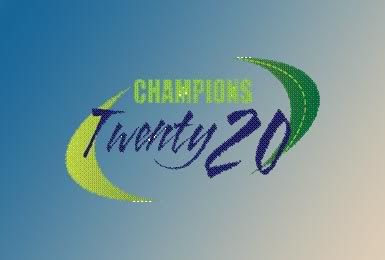
The Twenty20 Champions League is an international Twenty20 cricket competition between clubs from Australia, England, India, Pakistan and South Africa. The Twenty20 Champions League is chaired by Lalit Modi, who is the Chairman and Commissioner of the Indian Premier League and Vice-President of the BCCI. The competition is being launched in 2008 as a response to the success of national Twenty20 domestic cricket leagues, most notably the Indian Premier League. The first edition was set to take place from late September to early October 2008 in India, after the tournament organisers resolved various teething problems that had put the inaugural tournament under some doubt, but it was later announced that the tournament would be held from December 3 to December 10, 2008. The initial tournament was postponed again following terrorist attacks in Mumbai in November 2008. A rearranged date has not been announced.
Background:
Chennai vs Kolkata in the Indian Premier League. Chennai have qualified for the first edition of the T20 Champions League
An international tournament for domestic cricket teams is believed to have been first mooted by Lalit Modi, vice-president of the Board of Control for Cricket in India (BCCI) in 1996, Lalit Modi is also the chairman and commissioner on the IPL. The launch and subsequent success of Twenty20 cricket some years later was the influence behind a serious effort to get such a tournament off the ground. Twenty20 cricket was launched by the England and Wales Cricket Board (ECB) in 2003. Its launch was a result of a long-term decline in the popularity of county championship and domestic limited-overs cricket. By reducing the number of overs per innings to twenty and by placing a three hour limit on matches, the format was designed to attract a younger crowd and to boost attendances. Twenty20 proved a success, with an international version launched in 2005 and a World Twenty20 Competition held in September 2007. This proved much more popular than the 50 over Cricket World Cup had been just five months previously. The following year, the Indian Premier League (IPL) was launched, proving that there could be a market for a big-spending domestic Twenty20 cricket league. The success of Twenty20 and the IPL lead many commentators to suggest that other forms of cricket would suffer, with some worrying about the effect of the popular fast-paced 'slogging' game on players' abilities in Test cricket.
Immediately after the end of the first series of the IPL, the cricket authorities in England, India, Australia and South Africa entered into discussions to create a new international club competition, to capitalize on the this success. The new tournament's £2.5m winning prize was described as "unprecedented" in cricket. A number of different formats for the tournament were considered, with original proposals containing a much lower prize fund. The T20 Champions League's creation was announced on 7 June 2008, along with the announcement of planned restructuring of some of the domestic cricket tournaments involved, including the introduction of franchising in South Africa, England and Australia. Pakistan's participation was always mooted, but not confirmed when the tournament was first launched. Following a series of discussions and the announcement of the creation of a Pakistan Super League from 2009, it was confirmed that two Pakistani teams would compete.
Format:
Qualifying:
Although the 2008 tournament was originally rumoured to only include teams from Australia, South Africa, India and England, it was announced on 4 July 2008, that two teams from Pakistan's domestic tournament were also invited. At the same, time England's participation was also put into doubt, following differences between the ECB & BCCI over the inclusion of rebel Indian Cricket League (ICL) players. Eventually, it was arranged so that the 2008 Twenty20 Champions League is to be contested between 8 teams from 5 countries. The qualifiers are:
This format is expected to change as 12 teams will compete in the 2nd edition of the tournament in September-October 2009.
England's Participation:
The organisers of the tournament confirmed that any team competing would be banned from fielding players who have competed in the Indian Cricket League, a rival to the Indian Premier League. As a result of this, England's participation in the tournament was put in jeopardy. For the the 2008 season, 15 of the 18 counties fielded 25 players from the ICL. On 24 July 2008, IPL commissioner Lalit Modi confirmed their stance by stating that only Middlesex and Essex stood a chance of being invited to the Champions League because they didn't have ICL links. Middlesex won the Twenty20 Cup and confirmed they had accepted the invitation to participate in the tournament. Kent were officially barred from the competition on 1 August, and the ECB's suggestion to replace them with Essex was rejected by Cricket Australia.
Tournament:
The Twenty20 Champions League will be played over an eight day period and will consist of two divisions competing in a round-robin format. The top two teams from each division will then move on to an elimination round to the finals.
Links to more information on the Twenty20 Champions League:
*Acknowledgements to Wikipedia.org and owners of pictures and videos used.
















No comments:
Post a Comment